Law For Business Managers Assesment
VerifiedAdded on 2022/09/02
|14
|3912
|18
AI Summary
Contribute Materials
Your contribution can guide someone’s learning journey. Share your
documents today.
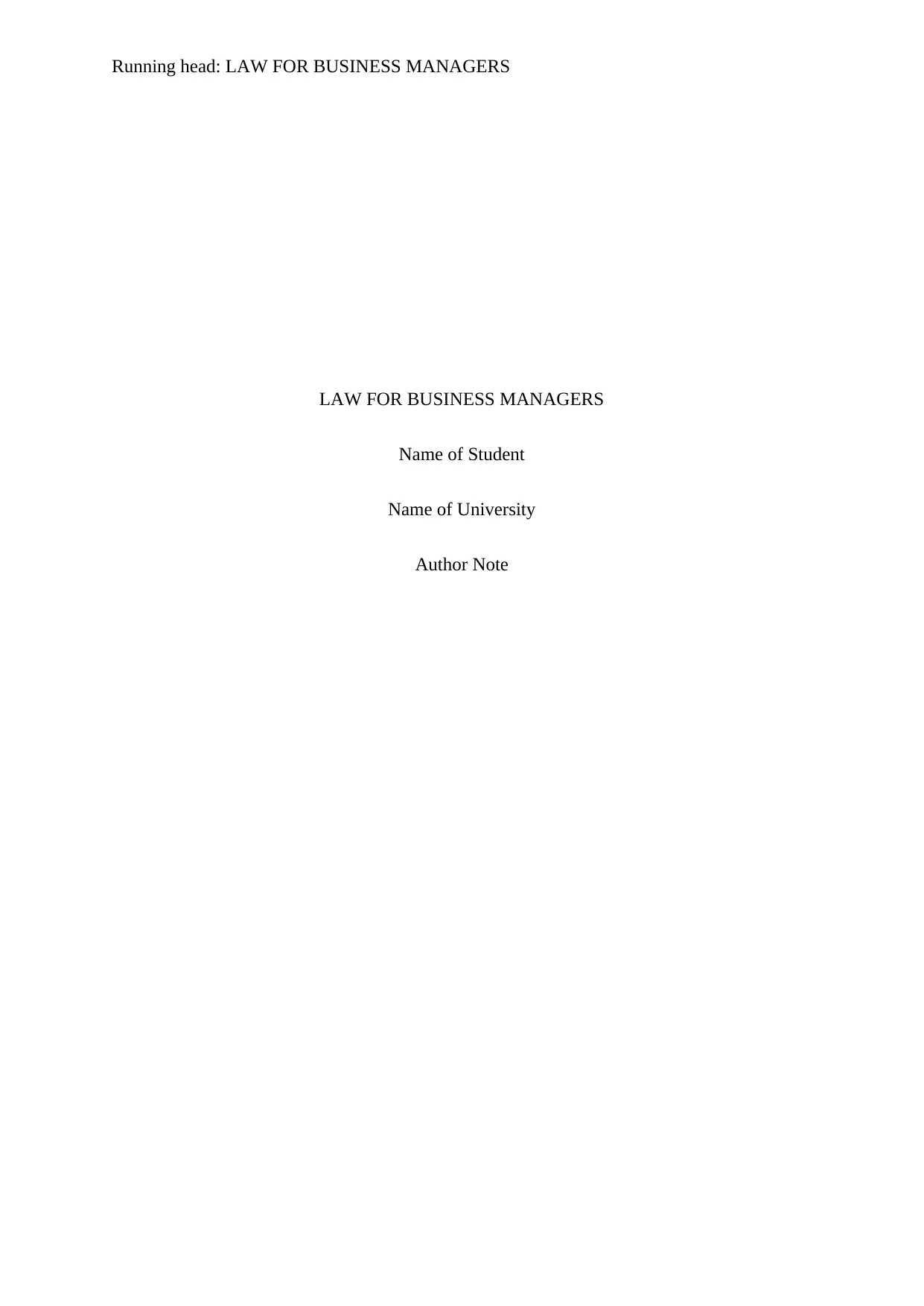
Running head: LAW FOR BUSINESS MANAGERS
LAW FOR BUSINESS MANAGERS
Name of Student
Name of University
Author Note
LAW FOR BUSINESS MANAGERS
Name of Student
Name of University
Author Note
Secure Best Marks with AI Grader
Need help grading? Try our AI Grader for instant feedback on your assignments.
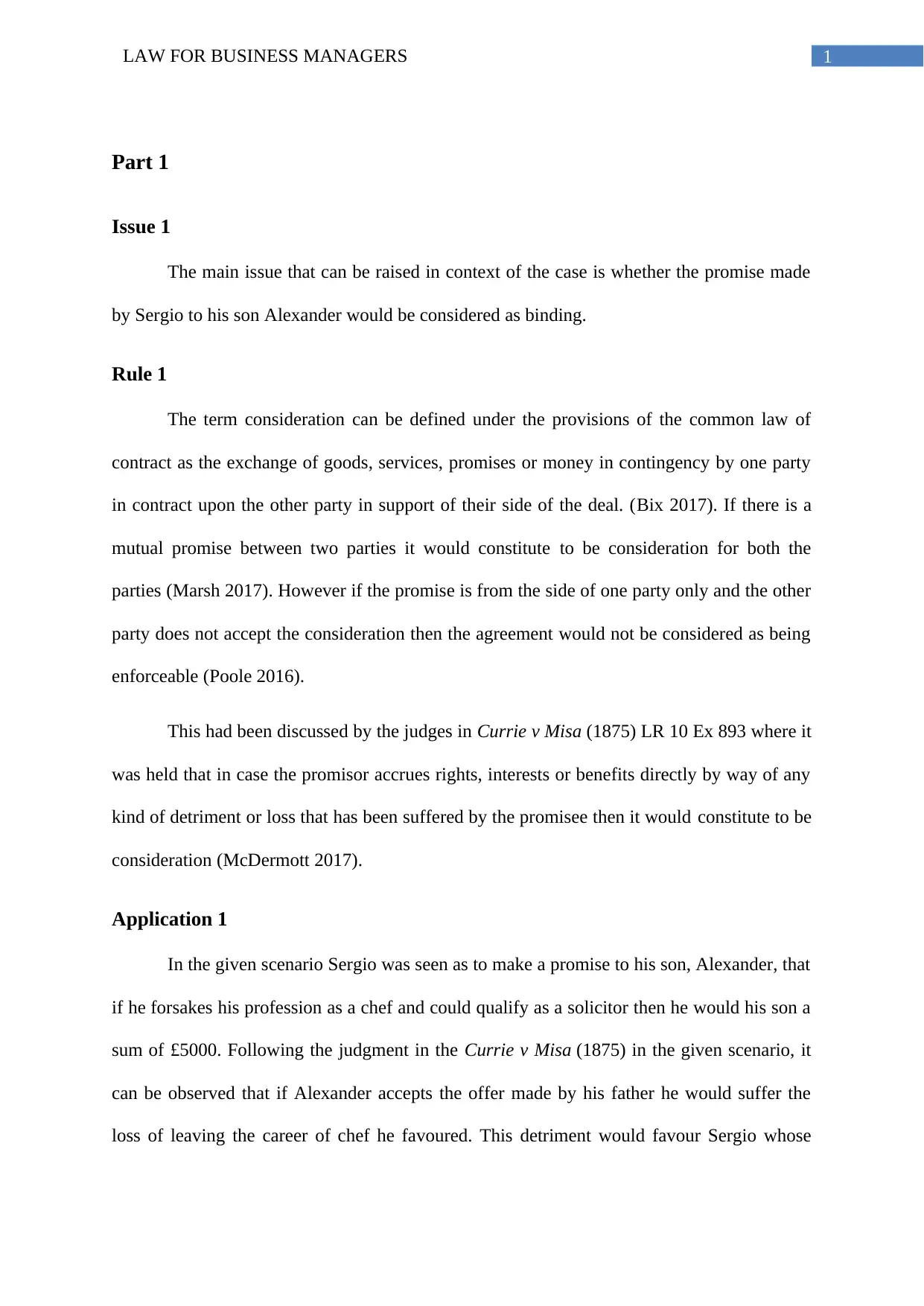
1LAW FOR BUSINESS MANAGERS
Part 1
Issue 1
The main issue that can be raised in context of the case is whether the promise made
by Sergio to his son Alexander would be considered as binding.
Rule 1
The term consideration can be defined under the provisions of the common law of
contract as the exchange of goods, services, promises or money in contingency by one party
in contract upon the other party in support of their side of the deal. (Bix 2017). If there is a
mutual promise between two parties it would constitute to be consideration for both the
parties (Marsh 2017). However if the promise is from the side of one party only and the other
party does not accept the consideration then the agreement would not be considered as being
enforceable (Poole 2016).
This had been discussed by the judges in Currie v Misa (1875) LR 10 Ex 893 where it
was held that in case the promisor accrues rights, interests or benefits directly by way of any
kind of detriment or loss that has been suffered by the promisee then it would constitute to be
consideration (McDermott 2017).
Application 1
In the given scenario Sergio was seen as to make a promise to his son, Alexander, that
if he forsakes his profession as a chef and could qualify as a solicitor then he would his son a
sum of £5000. Following the judgment in the Currie v Misa (1875) in the given scenario, it
can be observed that if Alexander accepts the offer made by his father he would suffer the
loss of leaving the career of chef he favoured. This detriment would favour Sergio whose
Part 1
Issue 1
The main issue that can be raised in context of the case is whether the promise made
by Sergio to his son Alexander would be considered as binding.
Rule 1
The term consideration can be defined under the provisions of the common law of
contract as the exchange of goods, services, promises or money in contingency by one party
in contract upon the other party in support of their side of the deal. (Bix 2017). If there is a
mutual promise between two parties it would constitute to be consideration for both the
parties (Marsh 2017). However if the promise is from the side of one party only and the other
party does not accept the consideration then the agreement would not be considered as being
enforceable (Poole 2016).
This had been discussed by the judges in Currie v Misa (1875) LR 10 Ex 893 where it
was held that in case the promisor accrues rights, interests or benefits directly by way of any
kind of detriment or loss that has been suffered by the promisee then it would constitute to be
consideration (McDermott 2017).
Application 1
In the given scenario Sergio was seen as to make a promise to his son, Alexander, that
if he forsakes his profession as a chef and could qualify as a solicitor then he would his son a
sum of £5000. Following the judgment in the Currie v Misa (1875) in the given scenario, it
can be observed that if Alexander accepts the offer made by his father he would suffer the
loss of leaving the career of chef he favoured. This detriment would favour Sergio whose
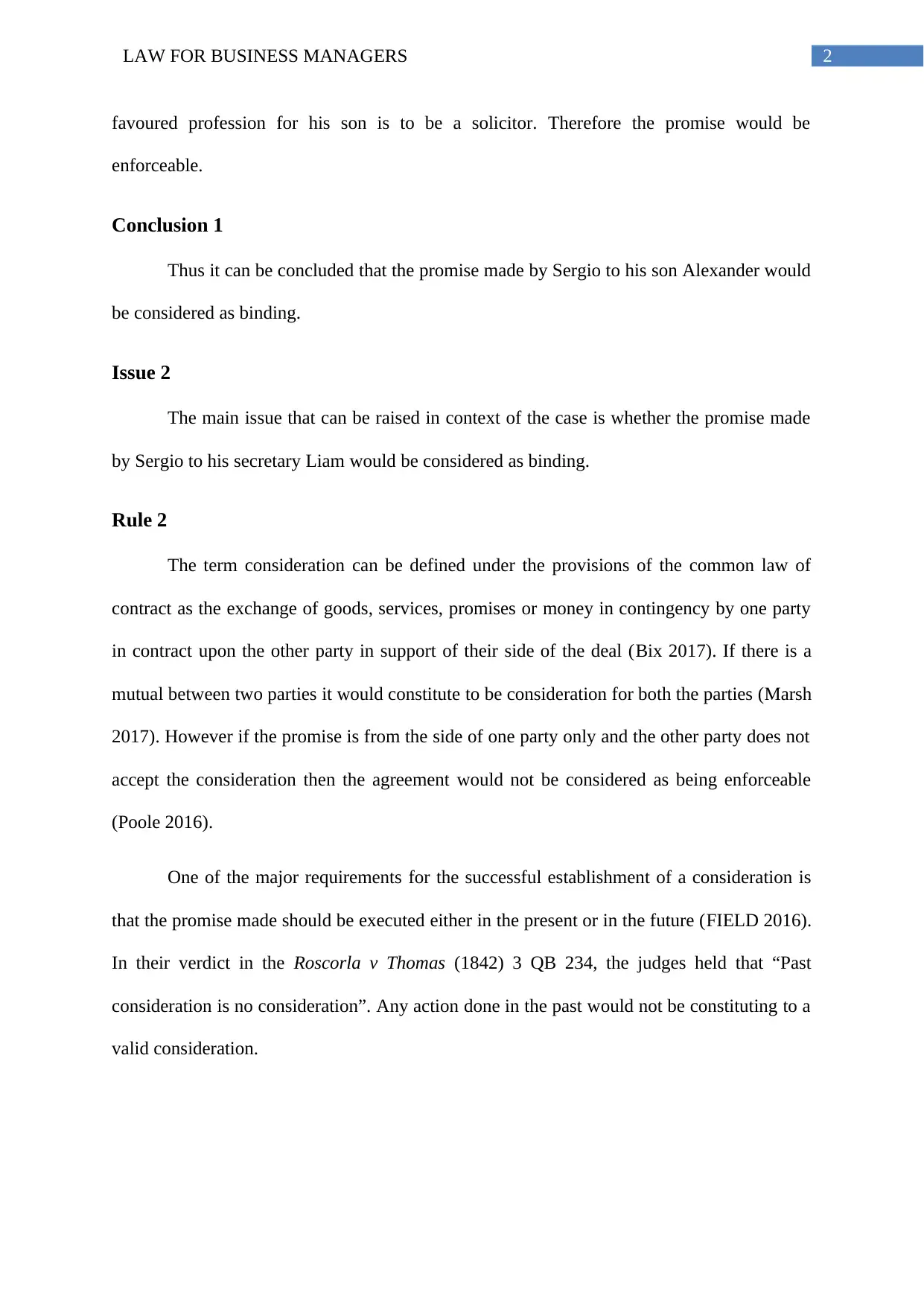
2LAW FOR BUSINESS MANAGERS
favoured profession for his son is to be a solicitor. Therefore the promise would be
enforceable.
Conclusion 1
Thus it can be concluded that the promise made by Sergio to his son Alexander would
be considered as binding.
Issue 2
The main issue that can be raised in context of the case is whether the promise made
by Sergio to his secretary Liam would be considered as binding.
Rule 2
The term consideration can be defined under the provisions of the common law of
contract as the exchange of goods, services, promises or money in contingency by one party
in contract upon the other party in support of their side of the deal (Bix 2017). If there is a
mutual between two parties it would constitute to be consideration for both the parties (Marsh
2017). However if the promise is from the side of one party only and the other party does not
accept the consideration then the agreement would not be considered as being enforceable
(Poole 2016).
One of the major requirements for the successful establishment of a consideration is
that the promise made should be executed either in the present or in the future (FIELD 2016).
In their verdict in the Roscorla v Thomas (1842) 3 QB 234, the judges held that “Past
consideration is no consideration”. Any action done in the past would not be constituting to a
valid consideration.
favoured profession for his son is to be a solicitor. Therefore the promise would be
enforceable.
Conclusion 1
Thus it can be concluded that the promise made by Sergio to his son Alexander would
be considered as binding.
Issue 2
The main issue that can be raised in context of the case is whether the promise made
by Sergio to his secretary Liam would be considered as binding.
Rule 2
The term consideration can be defined under the provisions of the common law of
contract as the exchange of goods, services, promises or money in contingency by one party
in contract upon the other party in support of their side of the deal (Bix 2017). If there is a
mutual between two parties it would constitute to be consideration for both the parties (Marsh
2017). However if the promise is from the side of one party only and the other party does not
accept the consideration then the agreement would not be considered as being enforceable
(Poole 2016).
One of the major requirements for the successful establishment of a consideration is
that the promise made should be executed either in the present or in the future (FIELD 2016).
In their verdict in the Roscorla v Thomas (1842) 3 QB 234, the judges held that “Past
consideration is no consideration”. Any action done in the past would not be constituting to a
valid consideration.
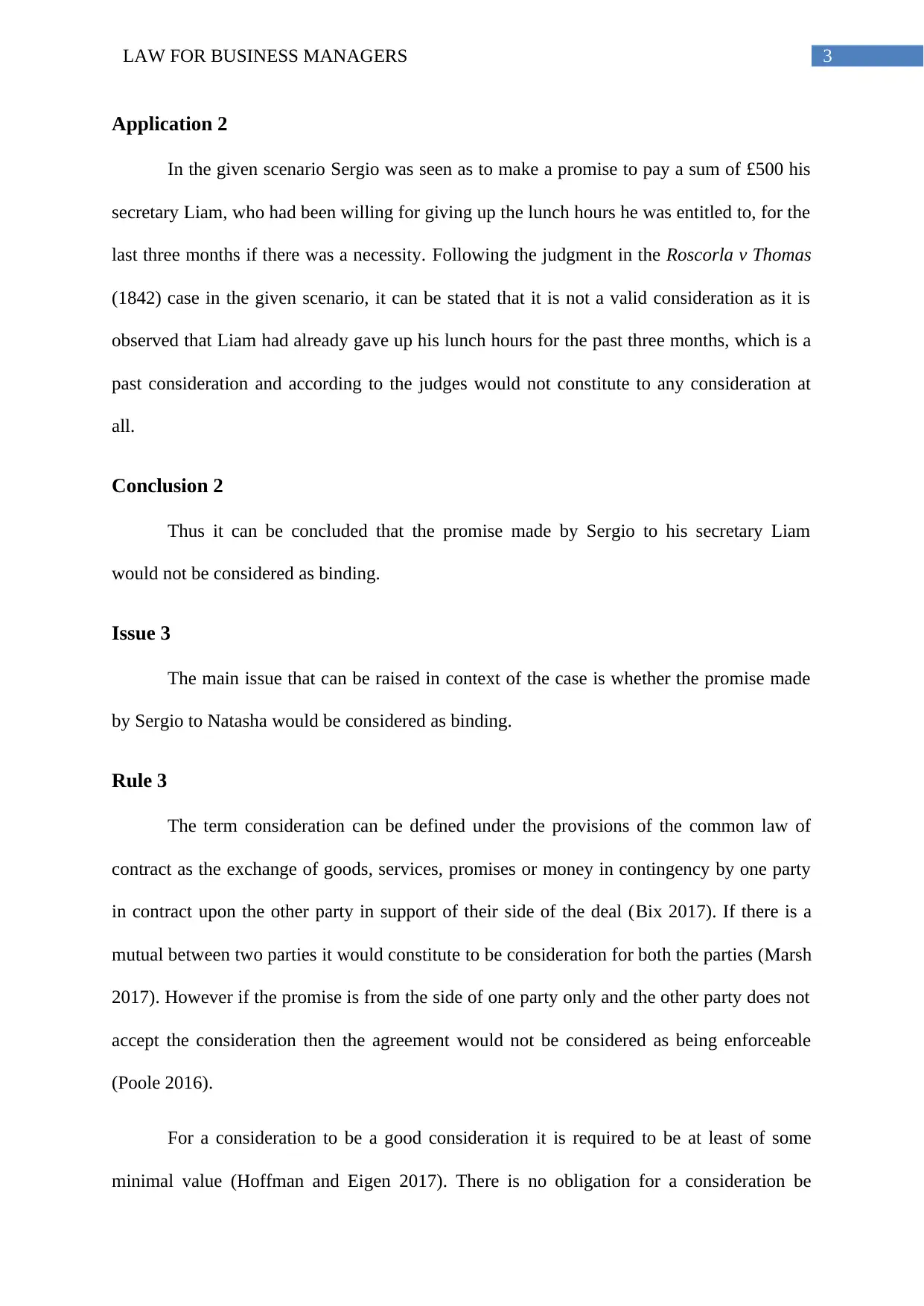
3LAW FOR BUSINESS MANAGERS
Application 2
In the given scenario Sergio was seen as to make a promise to pay a sum of £500 his
secretary Liam, who had been willing for giving up the lunch hours he was entitled to, for the
last three months if there was a necessity. Following the judgment in the Roscorla v Thomas
(1842) case in the given scenario, it can be stated that it is not a valid consideration as it is
observed that Liam had already gave up his lunch hours for the past three months, which is a
past consideration and according to the judges would not constitute to any consideration at
all.
Conclusion 2
Thus it can be concluded that the promise made by Sergio to his secretary Liam
would not be considered as binding.
Issue 3
The main issue that can be raised in context of the case is whether the promise made
by Sergio to Natasha would be considered as binding.
Rule 3
The term consideration can be defined under the provisions of the common law of
contract as the exchange of goods, services, promises or money in contingency by one party
in contract upon the other party in support of their side of the deal (Bix 2017). If there is a
mutual between two parties it would constitute to be consideration for both the parties (Marsh
2017). However if the promise is from the side of one party only and the other party does not
accept the consideration then the agreement would not be considered as being enforceable
(Poole 2016).
For a consideration to be a good consideration it is required to be at least of some
minimal value (Hoffman and Eigen 2017). There is no obligation for a consideration be
Application 2
In the given scenario Sergio was seen as to make a promise to pay a sum of £500 his
secretary Liam, who had been willing for giving up the lunch hours he was entitled to, for the
last three months if there was a necessity. Following the judgment in the Roscorla v Thomas
(1842) case in the given scenario, it can be stated that it is not a valid consideration as it is
observed that Liam had already gave up his lunch hours for the past three months, which is a
past consideration and according to the judges would not constitute to any consideration at
all.
Conclusion 2
Thus it can be concluded that the promise made by Sergio to his secretary Liam
would not be considered as binding.
Issue 3
The main issue that can be raised in context of the case is whether the promise made
by Sergio to Natasha would be considered as binding.
Rule 3
The term consideration can be defined under the provisions of the common law of
contract as the exchange of goods, services, promises or money in contingency by one party
in contract upon the other party in support of their side of the deal (Bix 2017). If there is a
mutual between two parties it would constitute to be consideration for both the parties (Marsh
2017). However if the promise is from the side of one party only and the other party does not
accept the consideration then the agreement would not be considered as being enforceable
(Poole 2016).
For a consideration to be a good consideration it is required to be at least of some
minimal value (Hoffman and Eigen 2017). There is no obligation for a consideration be
Secure Best Marks with AI Grader
Need help grading? Try our AI Grader for instant feedback on your assignments.
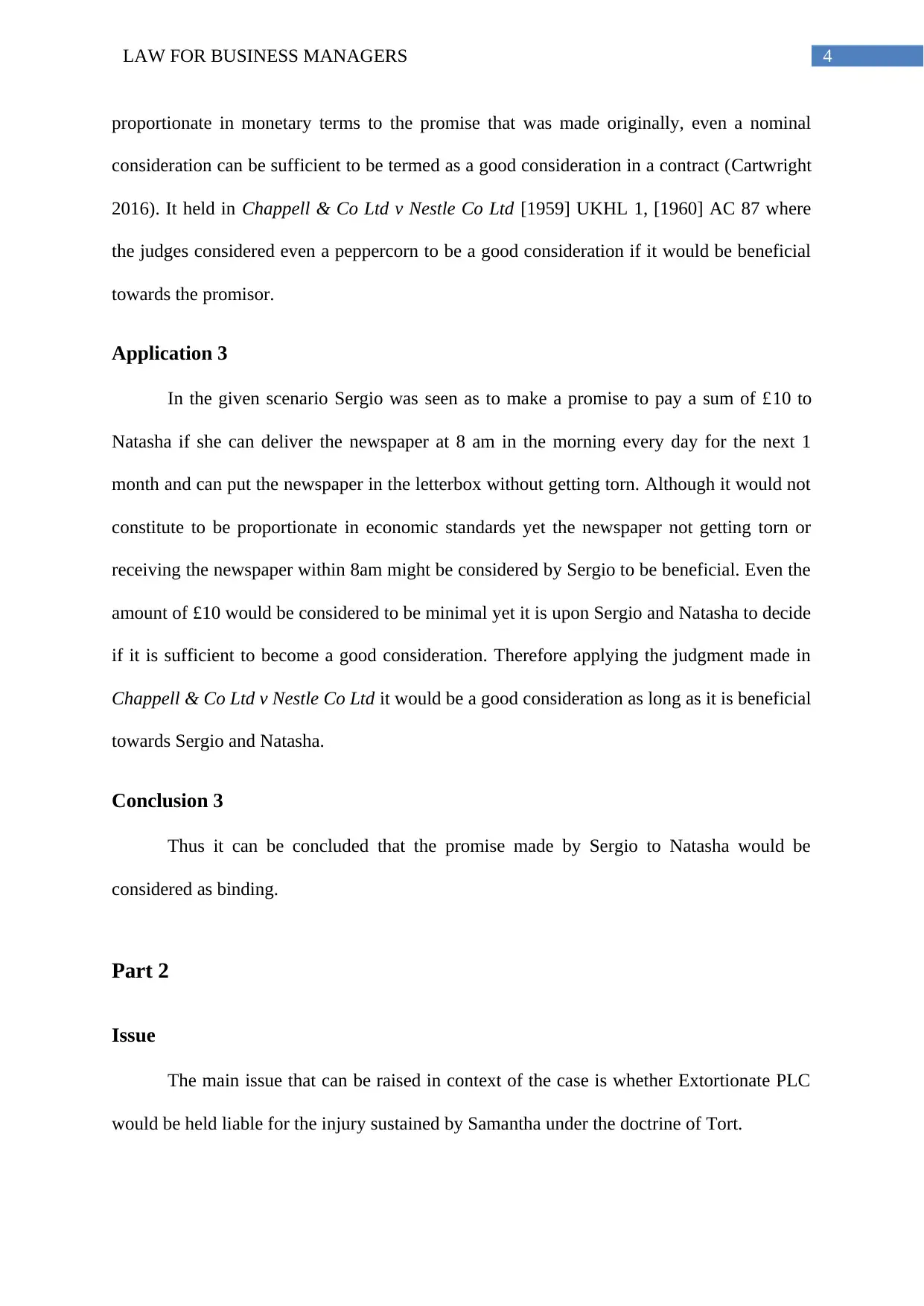
4LAW FOR BUSINESS MANAGERS
proportionate in monetary terms to the promise that was made originally, even a nominal
consideration can be sufficient to be termed as a good consideration in a contract (Cartwright
2016). It held in Chappell & Co Ltd v Nestle Co Ltd [1959] UKHL 1, [1960] AC 87 where
the judges considered even a peppercorn to be a good consideration if it would be beneficial
towards the promisor.
Application 3
In the given scenario Sergio was seen as to make a promise to pay a sum of £10 to
Natasha if she can deliver the newspaper at 8 am in the morning every day for the next 1
month and can put the newspaper in the letterbox without getting torn. Although it would not
constitute to be proportionate in economic standards yet the newspaper not getting torn or
receiving the newspaper within 8am might be considered by Sergio to be beneficial. Even the
amount of £10 would be considered to be minimal yet it is upon Sergio and Natasha to decide
if it is sufficient to become a good consideration. Therefore applying the judgment made in
Chappell & Co Ltd v Nestle Co Ltd it would be a good consideration as long as it is beneficial
towards Sergio and Natasha.
Conclusion 3
Thus it can be concluded that the promise made by Sergio to Natasha would be
considered as binding.
Part 2
Issue
The main issue that can be raised in context of the case is whether Extortionate PLC
would be held liable for the injury sustained by Samantha under the doctrine of Tort.
proportionate in monetary terms to the promise that was made originally, even a nominal
consideration can be sufficient to be termed as a good consideration in a contract (Cartwright
2016). It held in Chappell & Co Ltd v Nestle Co Ltd [1959] UKHL 1, [1960] AC 87 where
the judges considered even a peppercorn to be a good consideration if it would be beneficial
towards the promisor.
Application 3
In the given scenario Sergio was seen as to make a promise to pay a sum of £10 to
Natasha if she can deliver the newspaper at 8 am in the morning every day for the next 1
month and can put the newspaper in the letterbox without getting torn. Although it would not
constitute to be proportionate in economic standards yet the newspaper not getting torn or
receiving the newspaper within 8am might be considered by Sergio to be beneficial. Even the
amount of £10 would be considered to be minimal yet it is upon Sergio and Natasha to decide
if it is sufficient to become a good consideration. Therefore applying the judgment made in
Chappell & Co Ltd v Nestle Co Ltd it would be a good consideration as long as it is beneficial
towards Sergio and Natasha.
Conclusion 3
Thus it can be concluded that the promise made by Sergio to Natasha would be
considered as binding.
Part 2
Issue
The main issue that can be raised in context of the case is whether Extortionate PLC
would be held liable for the injury sustained by Samantha under the doctrine of Tort.
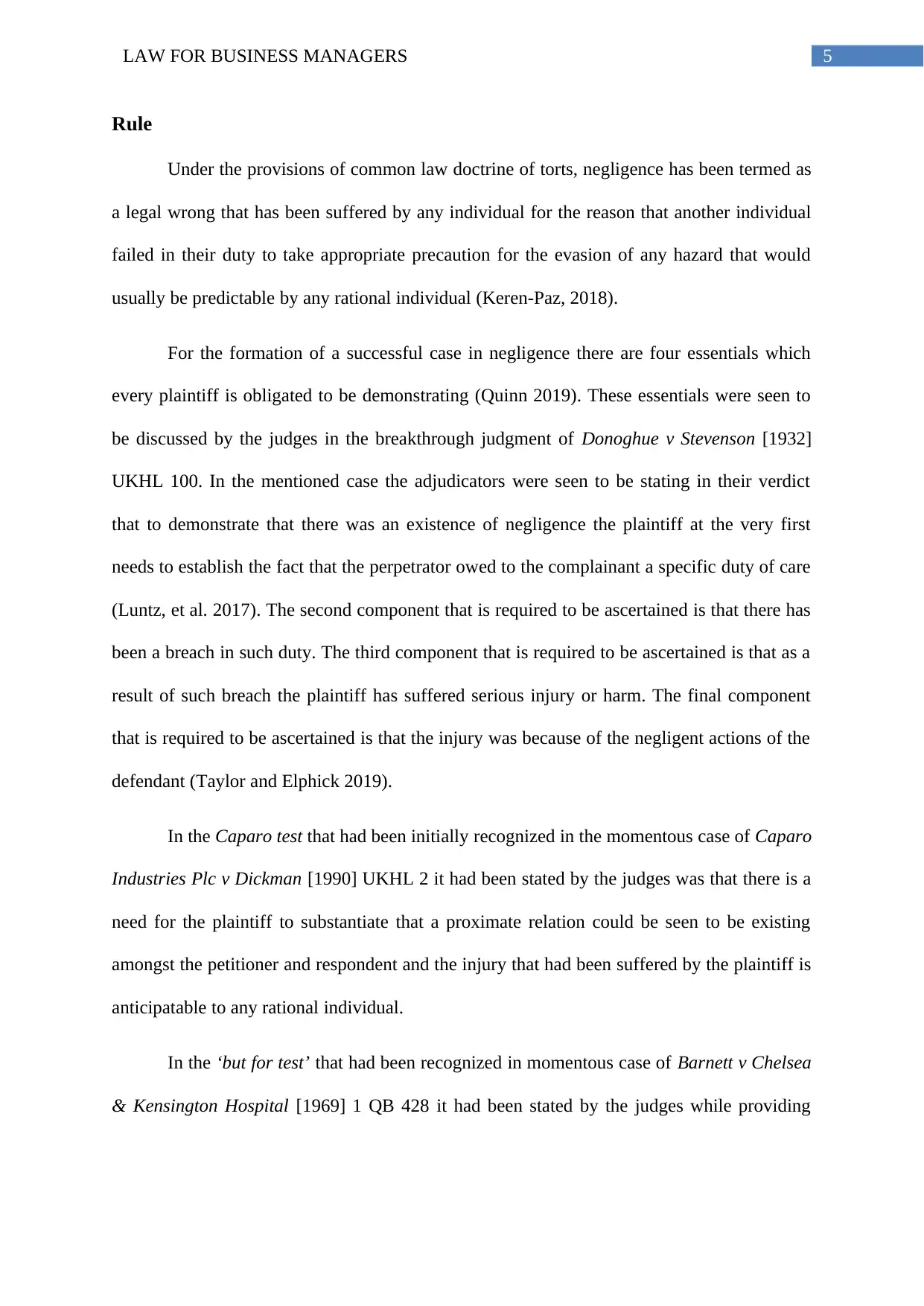
5LAW FOR BUSINESS MANAGERS
Rule
Under the provisions of common law doctrine of torts, negligence has been termed as
a legal wrong that has been suffered by any individual for the reason that another individual
failed in their duty to take appropriate precaution for the evasion of any hazard that would
usually be predictable by any rational individual (Keren-Paz, 2018).
For the formation of a successful case in negligence there are four essentials which
every plaintiff is obligated to be demonstrating (Quinn 2019). These essentials were seen to
be discussed by the judges in the breakthrough judgment of Donoghue v Stevenson [1932]
UKHL 100. In the mentioned case the adjudicators were seen to be stating in their verdict
that to demonstrate that there was an existence of negligence the plaintiff at the very first
needs to establish the fact that the perpetrator owed to the complainant a specific duty of care
(Luntz, et al. 2017). The second component that is required to be ascertained is that there has
been a breach in such duty. The third component that is required to be ascertained is that as a
result of such breach the plaintiff has suffered serious injury or harm. The final component
that is required to be ascertained is that the injury was because of the negligent actions of the
defendant (Taylor and Elphick 2019).
In the Caparo test that had been initially recognized in the momentous case of Caparo
Industries Plc v Dickman [1990] UKHL 2 it had been stated by the judges was that there is a
need for the plaintiff to substantiate that a proximate relation could be seen to be existing
amongst the petitioner and respondent and the injury that had been suffered by the plaintiff is
anticipatable to any rational individual.
In the ‘but for test’ that had been recognized in momentous case of Barnett v Chelsea
& Kensington Hospital [1969] 1 QB 428 it had been stated by the judges while providing
Rule
Under the provisions of common law doctrine of torts, negligence has been termed as
a legal wrong that has been suffered by any individual for the reason that another individual
failed in their duty to take appropriate precaution for the evasion of any hazard that would
usually be predictable by any rational individual (Keren-Paz, 2018).
For the formation of a successful case in negligence there are four essentials which
every plaintiff is obligated to be demonstrating (Quinn 2019). These essentials were seen to
be discussed by the judges in the breakthrough judgment of Donoghue v Stevenson [1932]
UKHL 100. In the mentioned case the adjudicators were seen to be stating in their verdict
that to demonstrate that there was an existence of negligence the plaintiff at the very first
needs to establish the fact that the perpetrator owed to the complainant a specific duty of care
(Luntz, et al. 2017). The second component that is required to be ascertained is that there has
been a breach in such duty. The third component that is required to be ascertained is that as a
result of such breach the plaintiff has suffered serious injury or harm. The final component
that is required to be ascertained is that the injury was because of the negligent actions of the
defendant (Taylor and Elphick 2019).
In the Caparo test that had been initially recognized in the momentous case of Caparo
Industries Plc v Dickman [1990] UKHL 2 it had been stated by the judges was that there is a
need for the plaintiff to substantiate that a proximate relation could be seen to be existing
amongst the petitioner and respondent and the injury that had been suffered by the plaintiff is
anticipatable to any rational individual.
In the ‘but for test’ that had been recognized in momentous case of Barnett v Chelsea
& Kensington Hospital [1969] 1 QB 428 it had been stated by the judges while providing
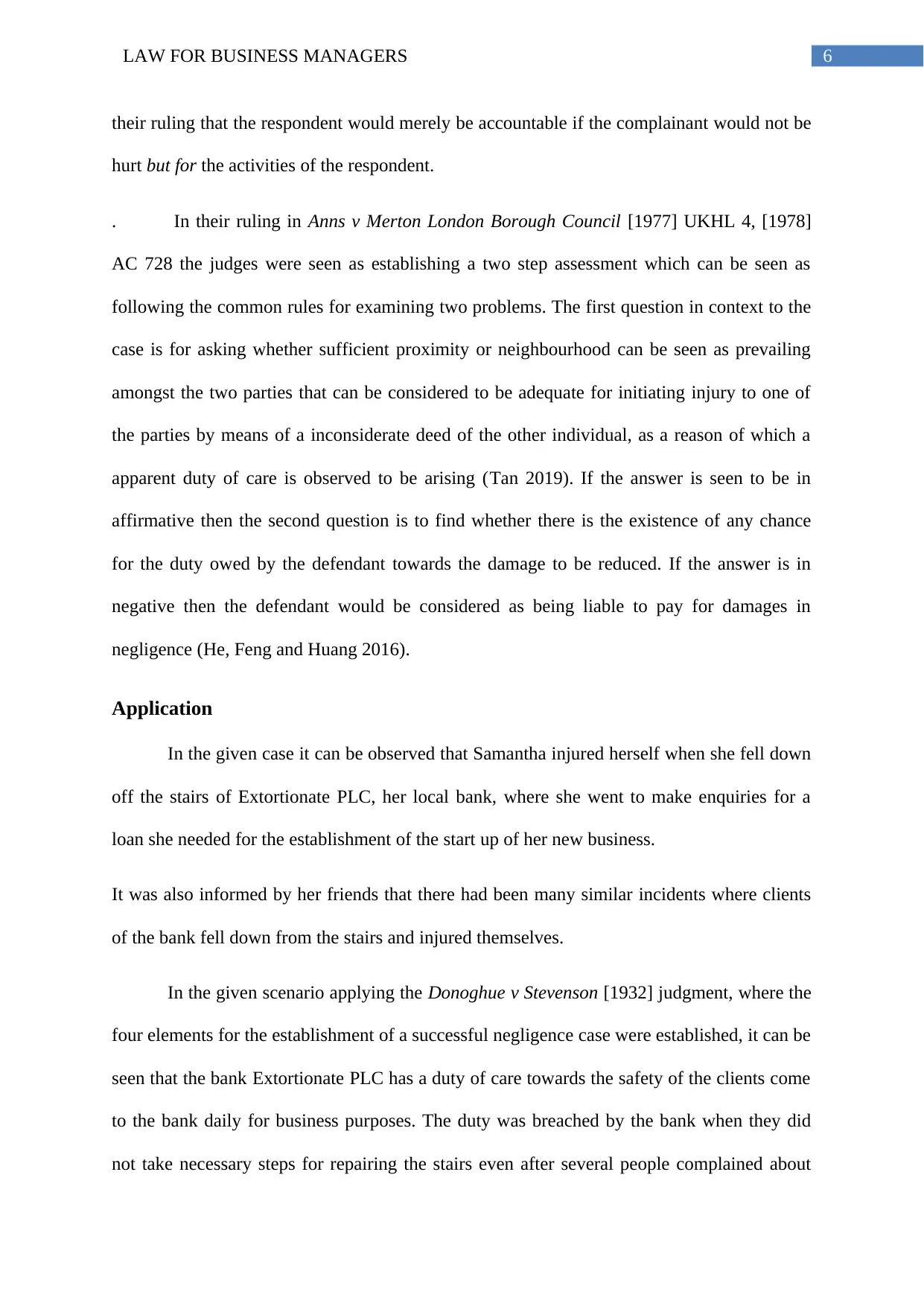
6LAW FOR BUSINESS MANAGERS
their ruling that the respondent would merely be accountable if the complainant would not be
hurt but for the activities of the respondent.
. In their ruling in Anns v Merton London Borough Council [1977] UKHL 4, [1978]
AC 728 the judges were seen as establishing a two step assessment which can be seen as
following the common rules for examining two problems. The first question in context to the
case is for asking whether sufficient proximity or neighbourhood can be seen as prevailing
amongst the two parties that can be considered to be adequate for initiating injury to one of
the parties by means of a inconsiderate deed of the other individual, as a reason of which a
apparent duty of care is observed to be arising (Tan 2019). If the answer is seen to be in
affirmative then the second question is to find whether there is the existence of any chance
for the duty owed by the defendant towards the damage to be reduced. If the answer is in
negative then the defendant would be considered as being liable to pay for damages in
negligence (He, Feng and Huang 2016).
Application
In the given case it can be observed that Samantha injured herself when she fell down
off the stairs of Extortionate PLC, her local bank, where she went to make enquiries for a
loan she needed for the establishment of the start up of her new business.
It was also informed by her friends that there had been many similar incidents where clients
of the bank fell down from the stairs and injured themselves.
In the given scenario applying the Donoghue v Stevenson [1932] judgment, where the
four elements for the establishment of a successful negligence case were established, it can be
seen that the bank Extortionate PLC has a duty of care towards the safety of the clients come
to the bank daily for business purposes. The duty was breached by the bank when they did
not take necessary steps for repairing the stairs even after several people complained about
their ruling that the respondent would merely be accountable if the complainant would not be
hurt but for the activities of the respondent.
. In their ruling in Anns v Merton London Borough Council [1977] UKHL 4, [1978]
AC 728 the judges were seen as establishing a two step assessment which can be seen as
following the common rules for examining two problems. The first question in context to the
case is for asking whether sufficient proximity or neighbourhood can be seen as prevailing
amongst the two parties that can be considered to be adequate for initiating injury to one of
the parties by means of a inconsiderate deed of the other individual, as a reason of which a
apparent duty of care is observed to be arising (Tan 2019). If the answer is seen to be in
affirmative then the second question is to find whether there is the existence of any chance
for the duty owed by the defendant towards the damage to be reduced. If the answer is in
negative then the defendant would be considered as being liable to pay for damages in
negligence (He, Feng and Huang 2016).
Application
In the given case it can be observed that Samantha injured herself when she fell down
off the stairs of Extortionate PLC, her local bank, where she went to make enquiries for a
loan she needed for the establishment of the start up of her new business.
It was also informed by her friends that there had been many similar incidents where clients
of the bank fell down from the stairs and injured themselves.
In the given scenario applying the Donoghue v Stevenson [1932] judgment, where the
four elements for the establishment of a successful negligence case were established, it can be
seen that the bank Extortionate PLC has a duty of care towards the safety of the clients come
to the bank daily for business purposes. The duty was breached by the bank when they did
not take necessary steps for repairing the stairs even after several people complained about
Paraphrase This Document
Need a fresh take? Get an instant paraphrase of this document with our AI Paraphraser
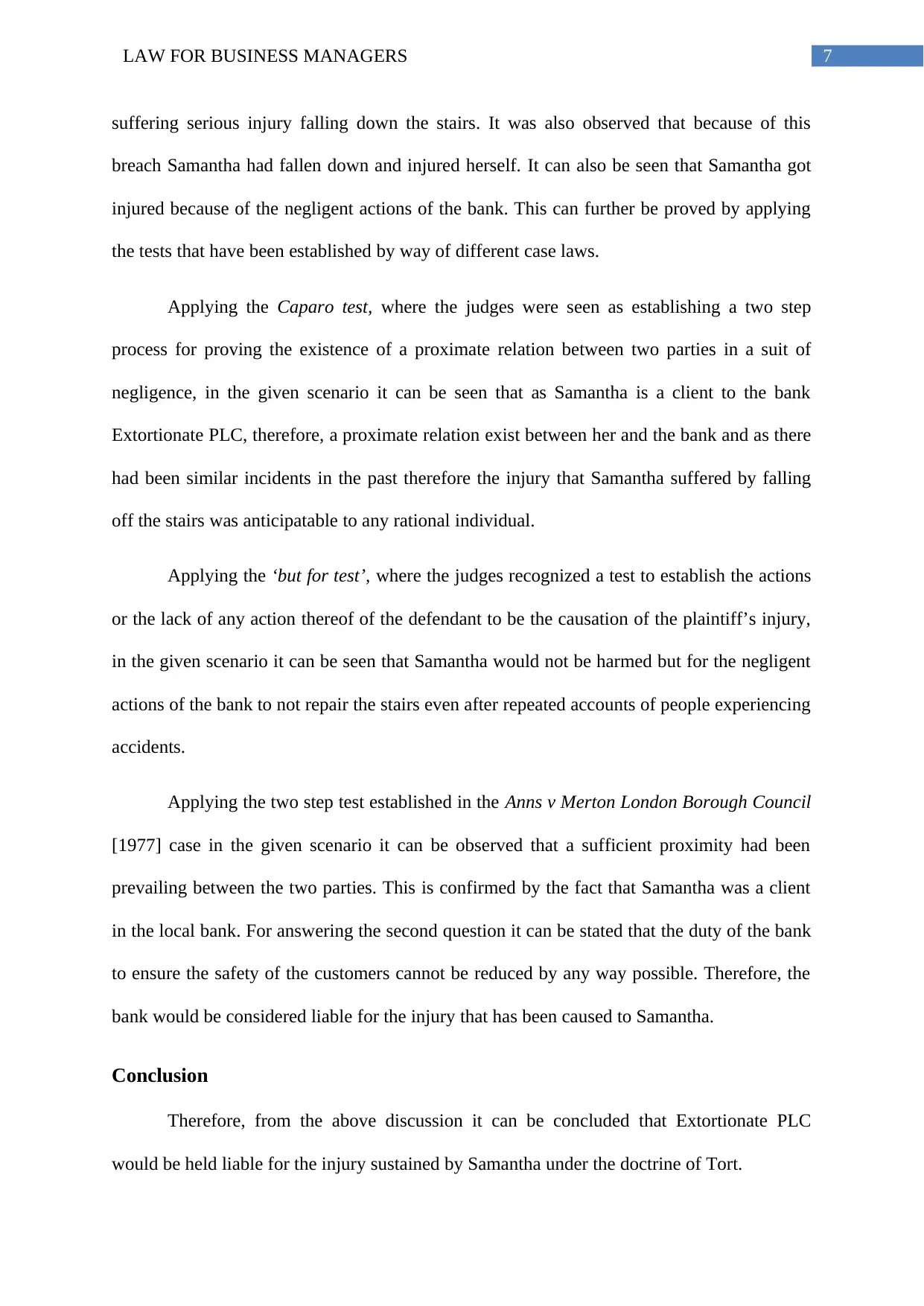
7LAW FOR BUSINESS MANAGERS
suffering serious injury falling down the stairs. It was also observed that because of this
breach Samantha had fallen down and injured herself. It can also be seen that Samantha got
injured because of the negligent actions of the bank. This can further be proved by applying
the tests that have been established by way of different case laws.
Applying the Caparo test, where the judges were seen as establishing a two step
process for proving the existence of a proximate relation between two parties in a suit of
negligence, in the given scenario it can be seen that as Samantha is a client to the bank
Extortionate PLC, therefore, a proximate relation exist between her and the bank and as there
had been similar incidents in the past therefore the injury that Samantha suffered by falling
off the stairs was anticipatable to any rational individual.
Applying the ‘but for test’, where the judges recognized a test to establish the actions
or the lack of any action thereof of the defendant to be the causation of the plaintiff’s injury,
in the given scenario it can be seen that Samantha would not be harmed but for the negligent
actions of the bank to not repair the stairs even after repeated accounts of people experiencing
accidents.
Applying the two step test established in the Anns v Merton London Borough Council
[1977] case in the given scenario it can be observed that a sufficient proximity had been
prevailing between the two parties. This is confirmed by the fact that Samantha was a client
in the local bank. For answering the second question it can be stated that the duty of the bank
to ensure the safety of the customers cannot be reduced by any way possible. Therefore, the
bank would be considered liable for the injury that has been caused to Samantha.
Conclusion
Therefore, from the above discussion it can be concluded that Extortionate PLC
would be held liable for the injury sustained by Samantha under the doctrine of Tort.
suffering serious injury falling down the stairs. It was also observed that because of this
breach Samantha had fallen down and injured herself. It can also be seen that Samantha got
injured because of the negligent actions of the bank. This can further be proved by applying
the tests that have been established by way of different case laws.
Applying the Caparo test, where the judges were seen as establishing a two step
process for proving the existence of a proximate relation between two parties in a suit of
negligence, in the given scenario it can be seen that as Samantha is a client to the bank
Extortionate PLC, therefore, a proximate relation exist between her and the bank and as there
had been similar incidents in the past therefore the injury that Samantha suffered by falling
off the stairs was anticipatable to any rational individual.
Applying the ‘but for test’, where the judges recognized a test to establish the actions
or the lack of any action thereof of the defendant to be the causation of the plaintiff’s injury,
in the given scenario it can be seen that Samantha would not be harmed but for the negligent
actions of the bank to not repair the stairs even after repeated accounts of people experiencing
accidents.
Applying the two step test established in the Anns v Merton London Borough Council
[1977] case in the given scenario it can be observed that a sufficient proximity had been
prevailing between the two parties. This is confirmed by the fact that Samantha was a client
in the local bank. For answering the second question it can be stated that the duty of the bank
to ensure the safety of the customers cannot be reduced by any way possible. Therefore, the
bank would be considered liable for the injury that has been caused to Samantha.
Conclusion
Therefore, from the above discussion it can be concluded that Extortionate PLC
would be held liable for the injury sustained by Samantha under the doctrine of Tort.
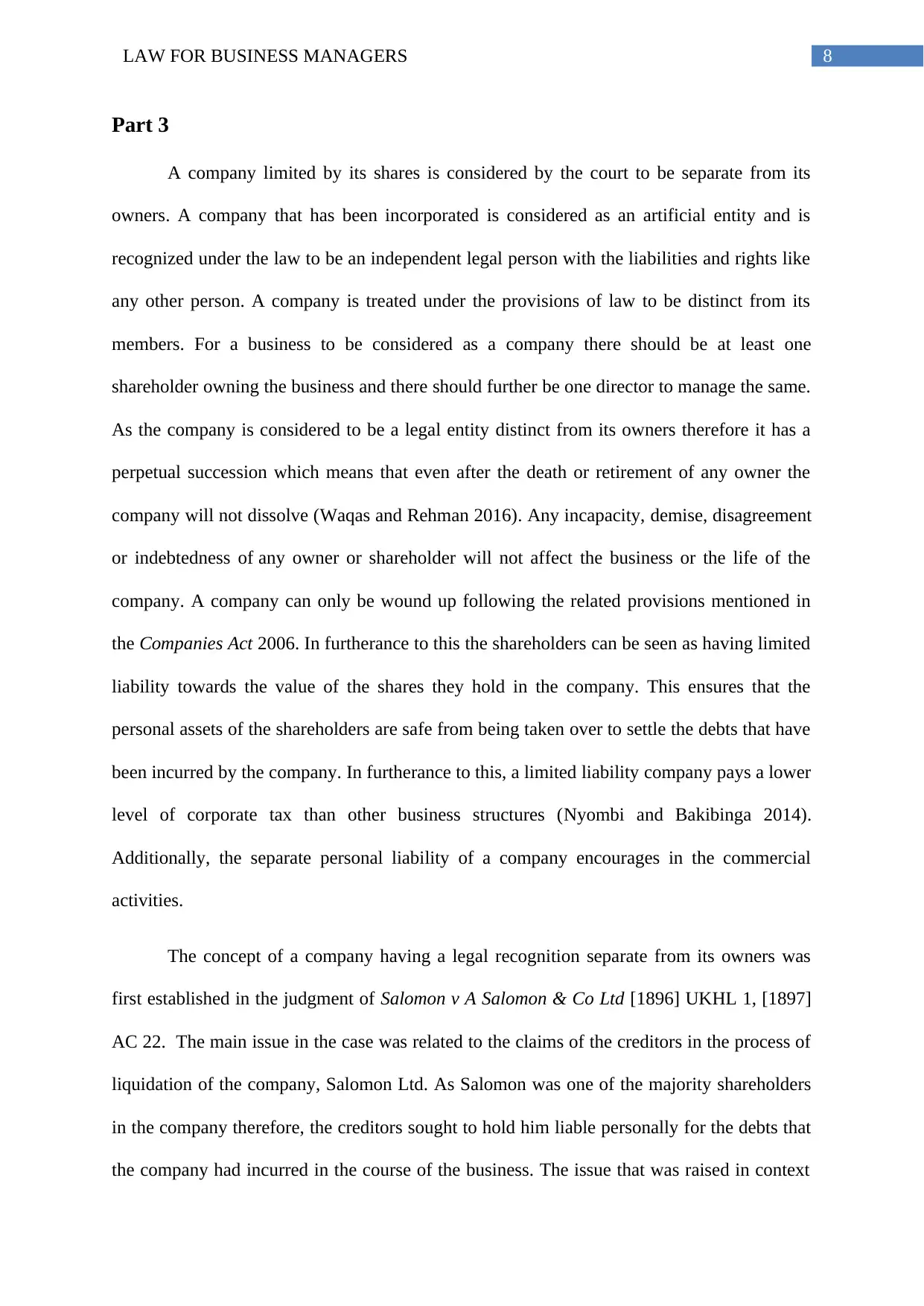
8LAW FOR BUSINESS MANAGERS
Part 3
A company limited by its shares is considered by the court to be separate from its
owners. A company that has been incorporated is considered as an artificial entity and is
recognized under the law to be an independent legal person with the liabilities and rights like
any other person. A company is treated under the provisions of law to be distinct from its
members. For a business to be considered as a company there should be at least one
shareholder owning the business and there should further be one director to manage the same.
As the company is considered to be a legal entity distinct from its owners therefore it has a
perpetual succession which means that even after the death or retirement of any owner the
company will not dissolve (Waqas and Rehman 2016). Any incapacity, demise, disagreement
or indebtedness of any owner or shareholder will not affect the business or the life of the
company. A company can only be wound up following the related provisions mentioned in
the Companies Act 2006. In furtherance to this the shareholders can be seen as having limited
liability towards the value of the shares they hold in the company. This ensures that the
personal assets of the shareholders are safe from being taken over to settle the debts that have
been incurred by the company. In furtherance to this, a limited liability company pays a lower
level of corporate tax than other business structures (Nyombi and Bakibinga 2014).
Additionally, the separate personal liability of a company encourages in the commercial
activities.
The concept of a company having a legal recognition separate from its owners was
first established in the judgment of Salomon v A Salomon & Co Ltd [1896] UKHL 1, [1897]
AC 22. The main issue in the case was related to the claims of the creditors in the process of
liquidation of the company, Salomon Ltd. As Salomon was one of the majority shareholders
in the company therefore, the creditors sought to hold him liable personally for the debts that
the company had incurred in the course of the business. The issue that was raised in context
Part 3
A company limited by its shares is considered by the court to be separate from its
owners. A company that has been incorporated is considered as an artificial entity and is
recognized under the law to be an independent legal person with the liabilities and rights like
any other person. A company is treated under the provisions of law to be distinct from its
members. For a business to be considered as a company there should be at least one
shareholder owning the business and there should further be one director to manage the same.
As the company is considered to be a legal entity distinct from its owners therefore it has a
perpetual succession which means that even after the death or retirement of any owner the
company will not dissolve (Waqas and Rehman 2016). Any incapacity, demise, disagreement
or indebtedness of any owner or shareholder will not affect the business or the life of the
company. A company can only be wound up following the related provisions mentioned in
the Companies Act 2006. In furtherance to this the shareholders can be seen as having limited
liability towards the value of the shares they hold in the company. This ensures that the
personal assets of the shareholders are safe from being taken over to settle the debts that have
been incurred by the company. In furtherance to this, a limited liability company pays a lower
level of corporate tax than other business structures (Nyombi and Bakibinga 2014).
Additionally, the separate personal liability of a company encourages in the commercial
activities.
The concept of a company having a legal recognition separate from its owners was
first established in the judgment of Salomon v A Salomon & Co Ltd [1896] UKHL 1, [1897]
AC 22. The main issue in the case was related to the claims of the creditors in the process of
liquidation of the company, Salomon Ltd. As Salomon was one of the majority shareholders
in the company therefore, the creditors sought to hold him liable personally for the debts that
the company had incurred in the course of the business. The issue that was raised in context
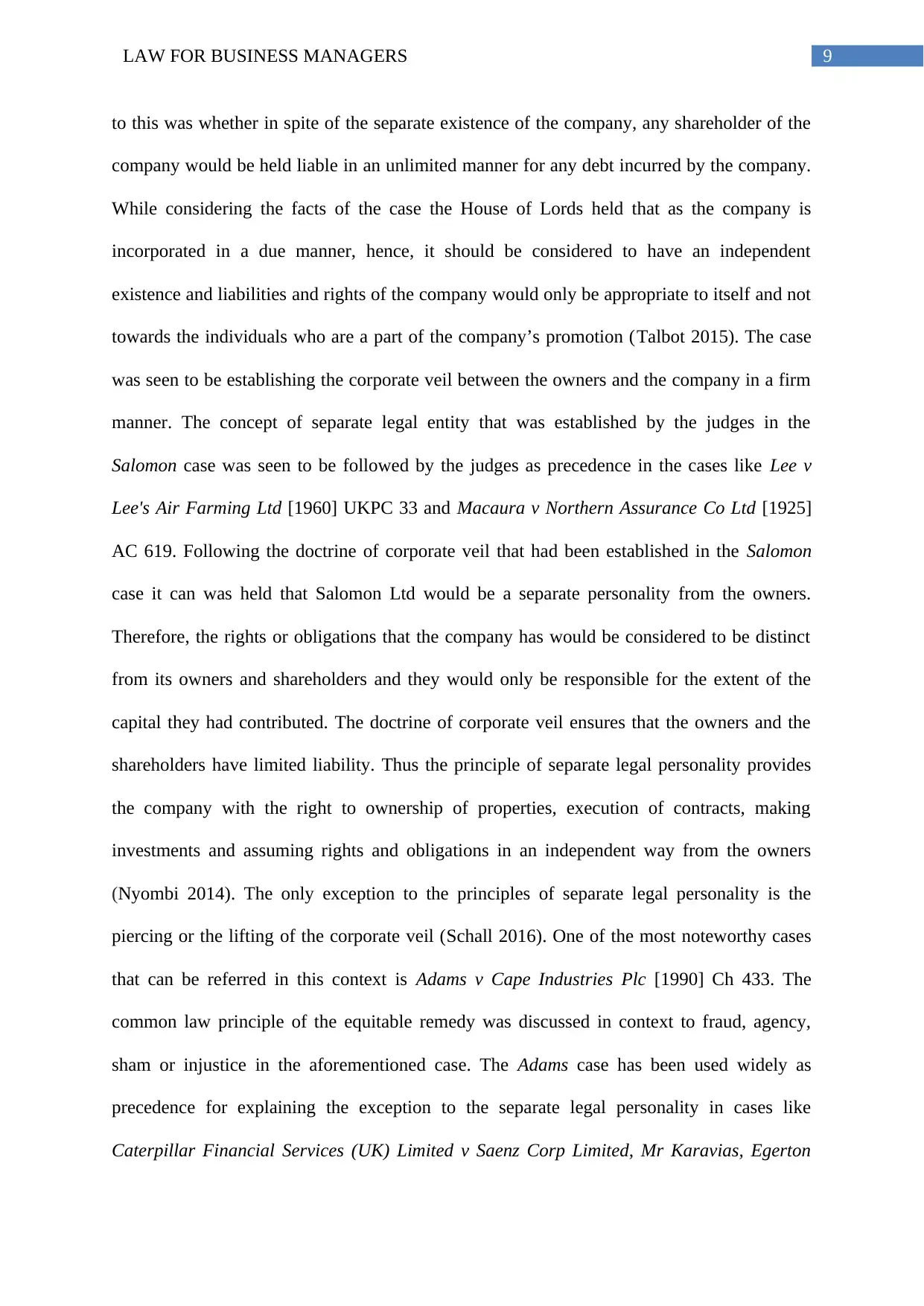
9LAW FOR BUSINESS MANAGERS
to this was whether in spite of the separate existence of the company, any shareholder of the
company would be held liable in an unlimited manner for any debt incurred by the company.
While considering the facts of the case the House of Lords held that as the company is
incorporated in a due manner, hence, it should be considered to have an independent
existence and liabilities and rights of the company would only be appropriate to itself and not
towards the individuals who are a part of the company’s promotion (Talbot 2015). The case
was seen to be establishing the corporate veil between the owners and the company in a firm
manner. The concept of separate legal entity that was established by the judges in the
Salomon case was seen to be followed by the judges as precedence in the cases like Lee v
Lee's Air Farming Ltd [1960] UKPC 33 and Macaura v Northern Assurance Co Ltd [1925]
AC 619. Following the doctrine of corporate veil that had been established in the Salomon
case it can was held that Salomon Ltd would be a separate personality from the owners.
Therefore, the rights or obligations that the company has would be considered to be distinct
from its owners and shareholders and they would only be responsible for the extent of the
capital they had contributed. The doctrine of corporate veil ensures that the owners and the
shareholders have limited liability. Thus the principle of separate legal personality provides
the company with the right to ownership of properties, execution of contracts, making
investments and assuming rights and obligations in an independent way from the owners
(Nyombi 2014). The only exception to the principles of separate legal personality is the
piercing or the lifting of the corporate veil (Schall 2016). One of the most noteworthy cases
that can be referred in this context is Adams v Cape Industries Plc [1990] Ch 433. The
common law principle of the equitable remedy was discussed in context to fraud, agency,
sham or injustice in the aforementioned case. The Adams case has been used widely as
precedence for explaining the exception to the separate legal personality in cases like
Caterpillar Financial Services (UK) Limited v Saenz Corp Limited, Mr Karavias, Egerton
to this was whether in spite of the separate existence of the company, any shareholder of the
company would be held liable in an unlimited manner for any debt incurred by the company.
While considering the facts of the case the House of Lords held that as the company is
incorporated in a due manner, hence, it should be considered to have an independent
existence and liabilities and rights of the company would only be appropriate to itself and not
towards the individuals who are a part of the company’s promotion (Talbot 2015). The case
was seen to be establishing the corporate veil between the owners and the company in a firm
manner. The concept of separate legal entity that was established by the judges in the
Salomon case was seen to be followed by the judges as precedence in the cases like Lee v
Lee's Air Farming Ltd [1960] UKPC 33 and Macaura v Northern Assurance Co Ltd [1925]
AC 619. Following the doctrine of corporate veil that had been established in the Salomon
case it can was held that Salomon Ltd would be a separate personality from the owners.
Therefore, the rights or obligations that the company has would be considered to be distinct
from its owners and shareholders and they would only be responsible for the extent of the
capital they had contributed. The doctrine of corporate veil ensures that the owners and the
shareholders have limited liability. Thus the principle of separate legal personality provides
the company with the right to ownership of properties, execution of contracts, making
investments and assuming rights and obligations in an independent way from the owners
(Nyombi 2014). The only exception to the principles of separate legal personality is the
piercing or the lifting of the corporate veil (Schall 2016). One of the most noteworthy cases
that can be referred in this context is Adams v Cape Industries Plc [1990] Ch 433. The
common law principle of the equitable remedy was discussed in context to fraud, agency,
sham or injustice in the aforementioned case. The Adams case has been used widely as
precedence for explaining the exception to the separate legal personality in cases like
Caterpillar Financial Services (UK) Limited v Saenz Corp Limited, Mr Karavias, Egerton
Secure Best Marks with AI Grader
Need help grading? Try our AI Grader for instant feedback on your assignments.
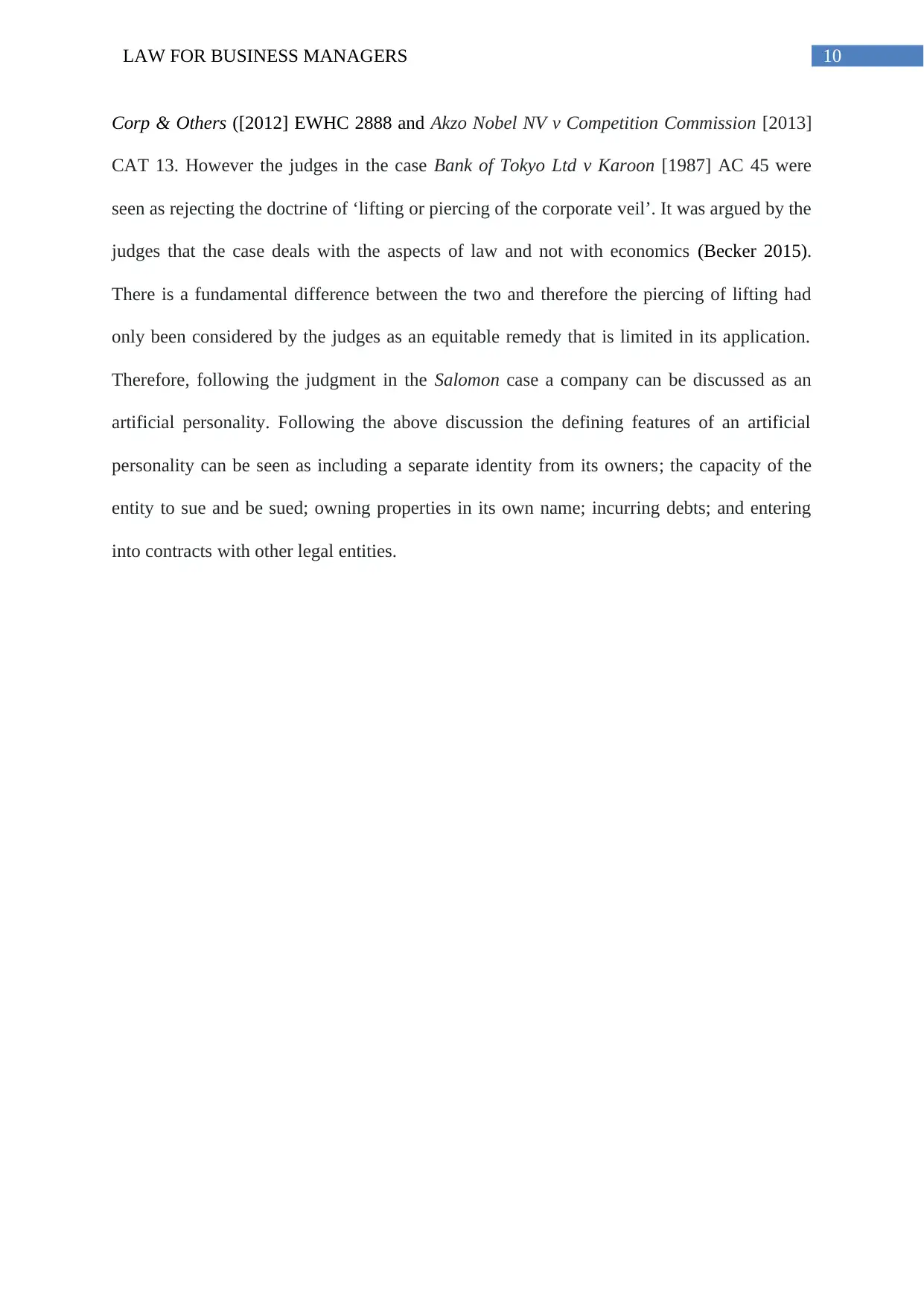
10LAW FOR BUSINESS MANAGERS
Corp & Others ([2012] EWHC 2888 and Akzo Nobel NV v Competition Commission [2013]
CAT 13. However the judges in the case Bank of Tokyo Ltd v Karoon [1987] AC 45 were
seen as rejecting the doctrine of ‘lifting or piercing of the corporate veil’. It was argued by the
judges that the case deals with the aspects of law and not with economics (Becker 2015).
There is a fundamental difference between the two and therefore the piercing of lifting had
only been considered by the judges as an equitable remedy that is limited in its application.
Therefore, following the judgment in the Salomon case a company can be discussed as an
artificial personality. Following the above discussion the defining features of an artificial
personality can be seen as including a separate identity from its owners; the capacity of the
entity to sue and be sued; owning properties in its own name; incurring debts; and entering
into contracts with other legal entities.
Corp & Others ([2012] EWHC 2888 and Akzo Nobel NV v Competition Commission [2013]
CAT 13. However the judges in the case Bank of Tokyo Ltd v Karoon [1987] AC 45 were
seen as rejecting the doctrine of ‘lifting or piercing of the corporate veil’. It was argued by the
judges that the case deals with the aspects of law and not with economics (Becker 2015).
There is a fundamental difference between the two and therefore the piercing of lifting had
only been considered by the judges as an equitable remedy that is limited in its application.
Therefore, following the judgment in the Salomon case a company can be discussed as an
artificial personality. Following the above discussion the defining features of an artificial
personality can be seen as including a separate identity from its owners; the capacity of the
entity to sue and be sued; owning properties in its own name; incurring debts; and entering
into contracts with other legal entities.
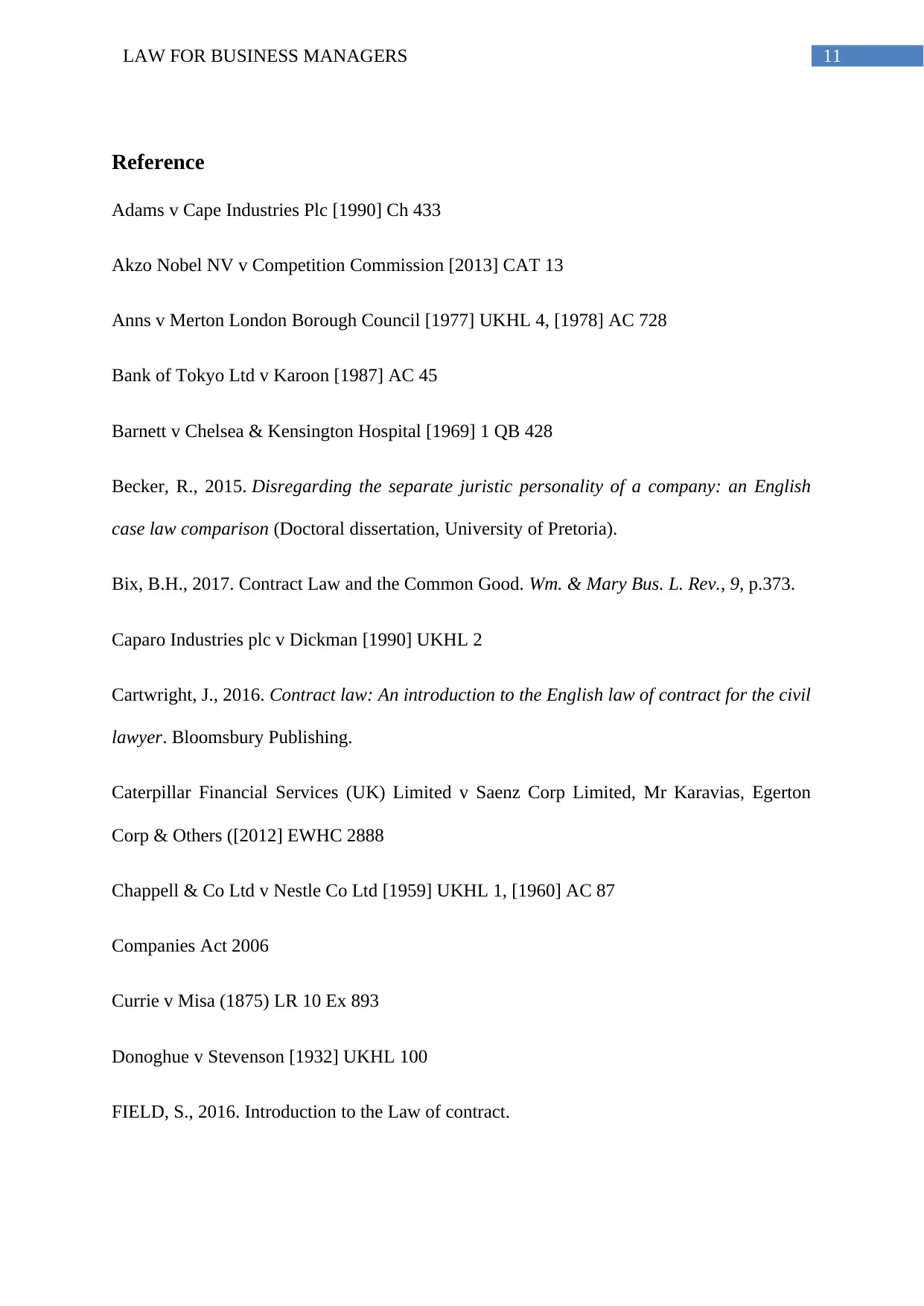
11LAW FOR BUSINESS MANAGERS
Reference
Adams v Cape Industries Plc [1990] Ch 433
Akzo Nobel NV v Competition Commission [2013] CAT 13
Anns v Merton London Borough Council [1977] UKHL 4, [1978] AC 728
Bank of Tokyo Ltd v Karoon [1987] AC 45
Barnett v Chelsea & Kensington Hospital [1969] 1 QB 428
Becker, R., 2015. Disregarding the separate juristic personality of a company: an English
case law comparison (Doctoral dissertation, University of Pretoria).
Bix, B.H., 2017. Contract Law and the Common Good. Wm. & Mary Bus. L. Rev., 9, p.373.
Caparo Industries plc v Dickman [1990] UKHL 2
Cartwright, J., 2016. Contract law: An introduction to the English law of contract for the civil
lawyer. Bloomsbury Publishing.
Caterpillar Financial Services (UK) Limited v Saenz Corp Limited, Mr Karavias, Egerton
Corp & Others ([2012] EWHC 2888
Chappell & Co Ltd v Nestle Co Ltd [1959] UKHL 1, [1960] AC 87
Companies Act 2006
Currie v Misa (1875) LR 10 Ex 893
Donoghue v Stevenson [1932] UKHL 100
FIELD, S., 2016. Introduction to the Law of contract.
Reference
Adams v Cape Industries Plc [1990] Ch 433
Akzo Nobel NV v Competition Commission [2013] CAT 13
Anns v Merton London Borough Council [1977] UKHL 4, [1978] AC 728
Bank of Tokyo Ltd v Karoon [1987] AC 45
Barnett v Chelsea & Kensington Hospital [1969] 1 QB 428
Becker, R., 2015. Disregarding the separate juristic personality of a company: an English
case law comparison (Doctoral dissertation, University of Pretoria).
Bix, B.H., 2017. Contract Law and the Common Good. Wm. & Mary Bus. L. Rev., 9, p.373.
Caparo Industries plc v Dickman [1990] UKHL 2
Cartwright, J., 2016. Contract law: An introduction to the English law of contract for the civil
lawyer. Bloomsbury Publishing.
Caterpillar Financial Services (UK) Limited v Saenz Corp Limited, Mr Karavias, Egerton
Corp & Others ([2012] EWHC 2888
Chappell & Co Ltd v Nestle Co Ltd [1959] UKHL 1, [1960] AC 87
Companies Act 2006
Currie v Misa (1875) LR 10 Ex 893
Donoghue v Stevenson [1932] UKHL 100
FIELD, S., 2016. Introduction to the Law of contract.
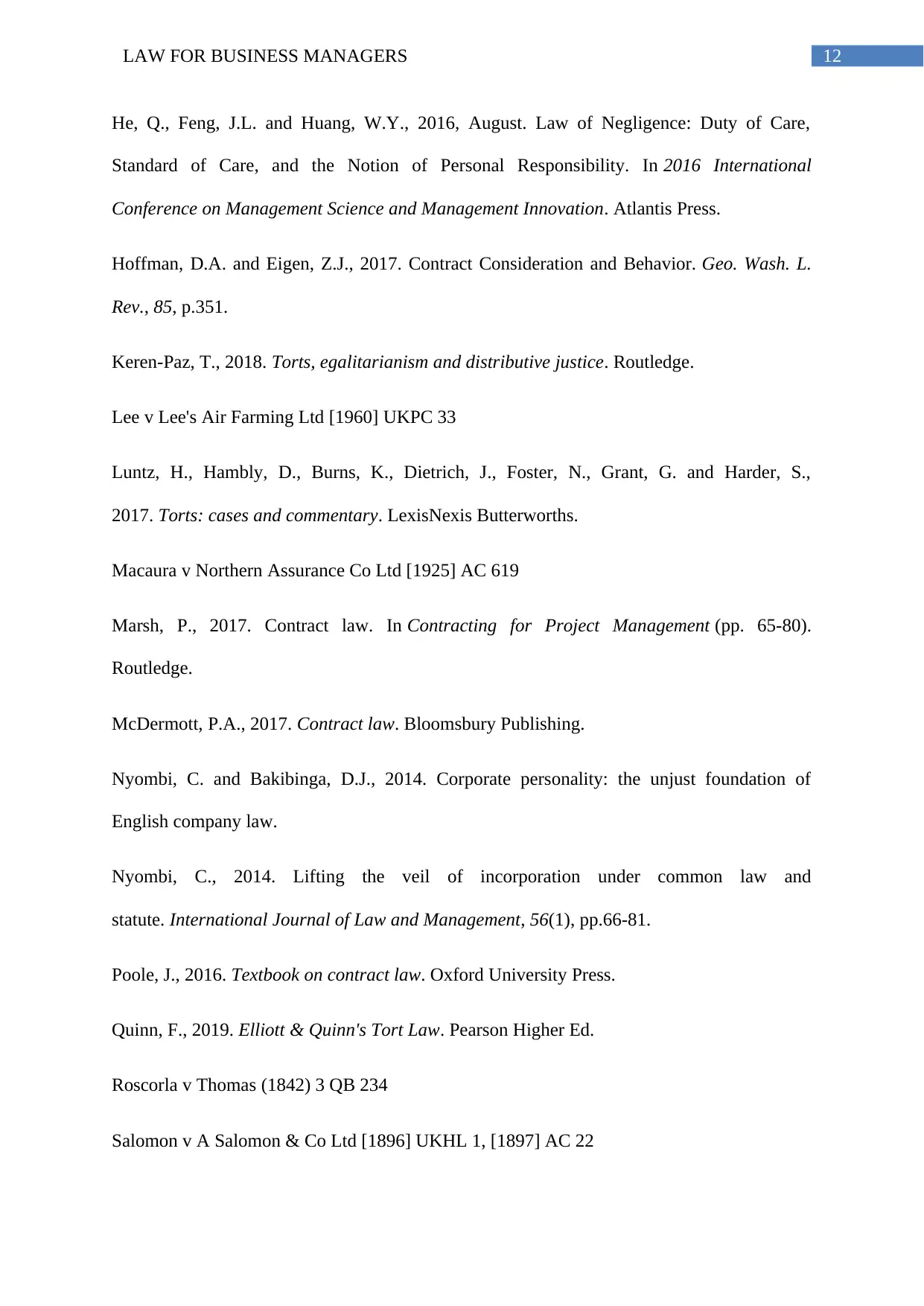
12LAW FOR BUSINESS MANAGERS
He, Q., Feng, J.L. and Huang, W.Y., 2016, August. Law of Negligence: Duty of Care,
Standard of Care, and the Notion of Personal Responsibility. In 2016 International
Conference on Management Science and Management Innovation. Atlantis Press.
Hoffman, D.A. and Eigen, Z.J., 2017. Contract Consideration and Behavior. Geo. Wash. L.
Rev., 85, p.351.
Keren-Paz, T., 2018. Torts, egalitarianism and distributive justice. Routledge.
Lee v Lee's Air Farming Ltd [1960] UKPC 33
Luntz, H., Hambly, D., Burns, K., Dietrich, J., Foster, N., Grant, G. and Harder, S.,
2017. Torts: cases and commentary. LexisNexis Butterworths.
Macaura v Northern Assurance Co Ltd [1925] AC 619
Marsh, P., 2017. Contract law. In Contracting for Project Management (pp. 65-80).
Routledge.
McDermott, P.A., 2017. Contract law. Bloomsbury Publishing.
Nyombi, C. and Bakibinga, D.J., 2014. Corporate personality: the unjust foundation of
English company law.
Nyombi, C., 2014. Lifting the veil of incorporation under common law and
statute. International Journal of Law and Management, 56(1), pp.66-81.
Poole, J., 2016. Textbook on contract law. Oxford University Press.
Quinn, F., 2019. Elliott & Quinn's Tort Law. Pearson Higher Ed.
Roscorla v Thomas (1842) 3 QB 234
Salomon v A Salomon & Co Ltd [1896] UKHL 1, [1897] AC 22
He, Q., Feng, J.L. and Huang, W.Y., 2016, August. Law of Negligence: Duty of Care,
Standard of Care, and the Notion of Personal Responsibility. In 2016 International
Conference on Management Science and Management Innovation. Atlantis Press.
Hoffman, D.A. and Eigen, Z.J., 2017. Contract Consideration and Behavior. Geo. Wash. L.
Rev., 85, p.351.
Keren-Paz, T., 2018. Torts, egalitarianism and distributive justice. Routledge.
Lee v Lee's Air Farming Ltd [1960] UKPC 33
Luntz, H., Hambly, D., Burns, K., Dietrich, J., Foster, N., Grant, G. and Harder, S.,
2017. Torts: cases and commentary. LexisNexis Butterworths.
Macaura v Northern Assurance Co Ltd [1925] AC 619
Marsh, P., 2017. Contract law. In Contracting for Project Management (pp. 65-80).
Routledge.
McDermott, P.A., 2017. Contract law. Bloomsbury Publishing.
Nyombi, C. and Bakibinga, D.J., 2014. Corporate personality: the unjust foundation of
English company law.
Nyombi, C., 2014. Lifting the veil of incorporation under common law and
statute. International Journal of Law and Management, 56(1), pp.66-81.
Poole, J., 2016. Textbook on contract law. Oxford University Press.
Quinn, F., 2019. Elliott & Quinn's Tort Law. Pearson Higher Ed.
Roscorla v Thomas (1842) 3 QB 234
Salomon v A Salomon & Co Ltd [1896] UKHL 1, [1897] AC 22
Paraphrase This Document
Need a fresh take? Get an instant paraphrase of this document with our AI Paraphraser
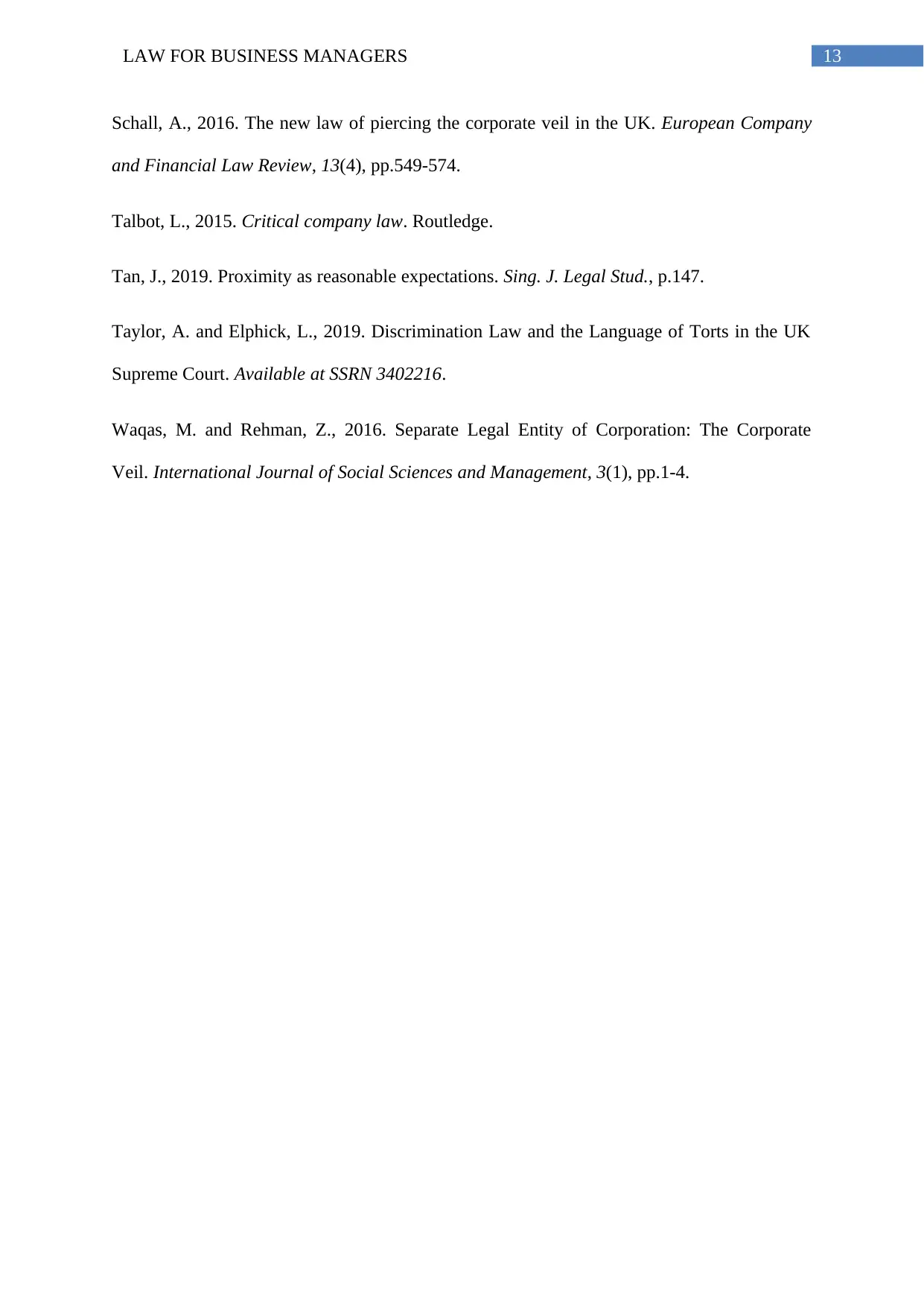
13LAW FOR BUSINESS MANAGERS
Schall, A., 2016. The new law of piercing the corporate veil in the UK. European Company
and Financial Law Review, 13(4), pp.549-574.
Talbot, L., 2015. Critical company law. Routledge.
Tan, J., 2019. Proximity as reasonable expectations. Sing. J. Legal Stud., p.147.
Taylor, A. and Elphick, L., 2019. Discrimination Law and the Language of Torts in the UK
Supreme Court. Available at SSRN 3402216.
Waqas, M. and Rehman, Z., 2016. Separate Legal Entity of Corporation: The Corporate
Veil. International Journal of Social Sciences and Management, 3(1), pp.1-4.
Schall, A., 2016. The new law of piercing the corporate veil in the UK. European Company
and Financial Law Review, 13(4), pp.549-574.
Talbot, L., 2015. Critical company law. Routledge.
Tan, J., 2019. Proximity as reasonable expectations. Sing. J. Legal Stud., p.147.
Taylor, A. and Elphick, L., 2019. Discrimination Law and the Language of Torts in the UK
Supreme Court. Available at SSRN 3402216.
Waqas, M. and Rehman, Z., 2016. Separate Legal Entity of Corporation: The Corporate
Veil. International Journal of Social Sciences and Management, 3(1), pp.1-4.
1 out of 14
Related Documents
Your All-in-One AI-Powered Toolkit for Academic Success.
+13062052269
info@desklib.com
Available 24*7 on WhatsApp / Email
![[object Object]](/_next/static/media/star-bottom.7253800d.svg)
Unlock your academic potential
© 2024 | Zucol Services PVT LTD | All rights reserved.





